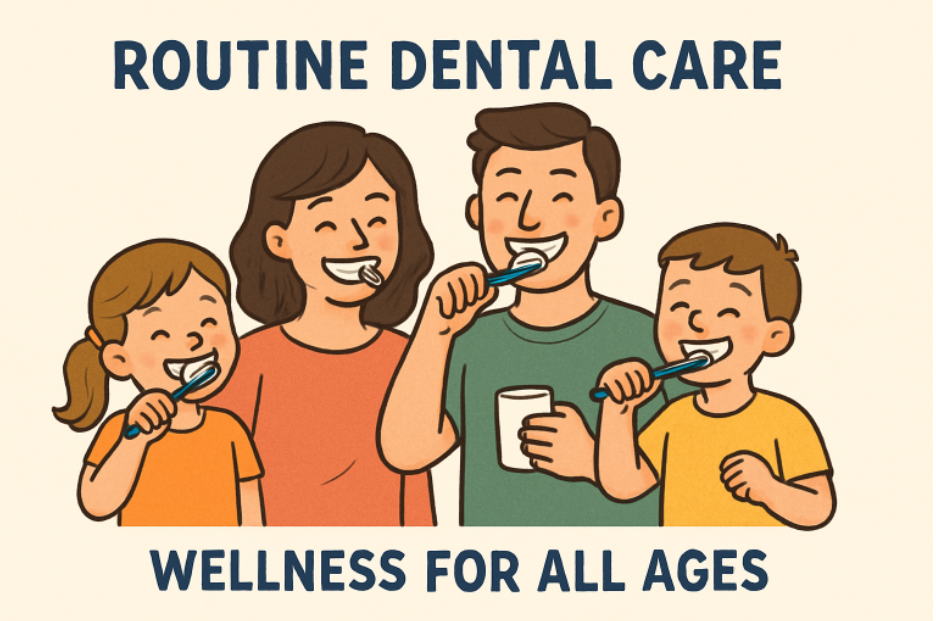Introduction
Maintaining optimal dental health does far more than ensure a bright, confident smile—it acts as a foundation for overall well-being throughout life. Scientific research continues to confirm that routine dental visits reduce the risk of various chronic illnesses. Proactive steps, such as regular dental check-ups and access to affordable dental insurance, can empower families to form lifelong habits that support both dental and systemic health.
The connection between oral health and the body is increasingly clear. Dental professionals and health organizations alike advise that preventive dental care is one of the most effective strategies for not only protecting the mouth but also supporting total body wellness. Neglecting oral care can have ripple effects, leading to complications that impact one’s overall quality of life and long-term health outcomes.
Unresolved dental issues like untreated cavities or gum disease contribute to a higher risk of infection and inflammation elsewhere in the body, underlining the importance of integrating dental health as a key aspect of routine healthcare. Families and individuals are encouraged to take a proactive approach, focusing on dental care as a crucial component of overall health and well-being.
As access to information grows, so does the potential for adopting new strategies and technologies that further enhance both preventive interventions and patient engagement. Building and maintaining a daily oral health routine is a powerful investment in lifelong wellness for all ages.
Oral Health and Overall Wellness
The mouth is often described as a mirror to the body, with oral health providing insights into broader aspects of well-being. Numerous studies have identified strong links between poor oral hygiene and major systemic diseases, including heart disease, diabetes, stroke, and respiratory infections. The Canters for Disease Control and Prevention (CDC) highlights that inflammation caused by gum disease may elevate the risk for cardiovascular conditions.
Oral diseases left untreated can result in chronic pain, impaired chewing, and diminished self-esteem due to aesthetic concerns. Beyond the mouth, persistent dental infections can enter the bloodstream, impacting organs far removed from the jaw. Good oral hygiene isn’t just about healthy teeth and gums—it’s about protecting the entire body from unnecessary health threats.
 Preventive Dental Care
Preventive Dental Care
Preventive dental care is at the heart of lasting oral health. It means visiting the dentist for regular cleanings, routine exams, and identifying issues in their earliest stages. Dentists and hygienists offer valuable insights into brushing and flossing techniques, dietary advice, and the early detection of oral cancers. Advances such as digital X-rays and sealants have further enhanced the power of preventive approaches, lessening the risk of serious complications in both children and adults.
Routine professional cleanings help remove plaque and tartar that at-home brushing can miss, and experienced guidance can help families develop age-appropriate hygiene routines. According to Harvard Health Publishing, adults who consistently seek preventive care are less likely to suffer from extensive dental procedures, helping to preserve both their smiles and wallets over time.
Establishing Healthy Habits
For lifelong dental health, the habits formed in early childhood are pivotal. Parents and caregivers play a crucial role in modelling and enforcing routines, such as brushing twice a day, flossing, and maintaining a nutritious diet low in added sugars. Making dental care a positive and non-negotiable part of the daily schedule encourages children to carry these routines into adulthood.
Behavioural research also suggests linking new habits to existing ones—such as brushing teeth after breakfast and before bed—can make these actions automatic over time. Forming connections between oral hygiene and overall health in family conversations further reinforces their importance and can motivate lasting commitment.
Role of Family Dentistry
Family dentistry goes beyond treating teeth: it creates a culture of wellness, trust, and lifelong learning. Dental professionals who treat multiple generations are well-positioned to spot hereditary risks, offer tailored guidance, and build meaningful relationships that foster better health decisions. By adopting a whole-family approach, preventive care becomes routine, and education about oral-systemic health continues across the lifespan.
Moreover, family dentists act as accessible sources of support—answering questions, addressing dental anxieties, and adapting advice as children grow into adults. This continuity results in strong partnerships that make preventive care a natural part of everyone’s healthcare journey.
Economic Benefits of Preventive Care
Investing in routine dental check-ups and early intervention pays significant dividends over time. Untreated oral issues often lead to more complex, expensive treatments and missed days at work or school, resulting in increased direct medical expenses and indirect costs associated with lost productivity. The American Dental Association affirms that proactive oral care can reduce financial burdens while supporting greater social and economic stability.
Employers increasingly recognize the value of supporting preventive dental insurance, not only for reducing claims costs but also for minimizing employee absenteeism and improving overall workforce health.
Emerging Trends in Dental Care
Technology continues to reshape the landscape of dental care. More patients now benefit from innovations such as teledentistry, digital impressions, and personalized preventive guidance delivered through apps and wearable devices. These tools make dental care more available to a broader range of the population, especially those in rural or underserved areas. As digital health solutions become more sophisticated, patients can expect an enhanced level of access, accuracy, and continuity in their care.
Recent advancements in materials for fillings and sealants, as well as minimally invasive treatment techniques, result in less pain, a quicker recovery, and improved long-term oral health for patients of all ages.
Conclusion
Routine dental care is much more than a safeguard for a great smile—it’s a fundamental part of lifelong wellness, influencing everything from heart and metabolic health to economic productivity. Prioritizing preventive dental visits, supporting healthy habits at home, and embracing new technologies are all essential for improving quality of life and strengthening public health. By making dental care a routine rather than a reaction, individuals of all ages can enjoy the benefits of a healthier, more vibrant future.







